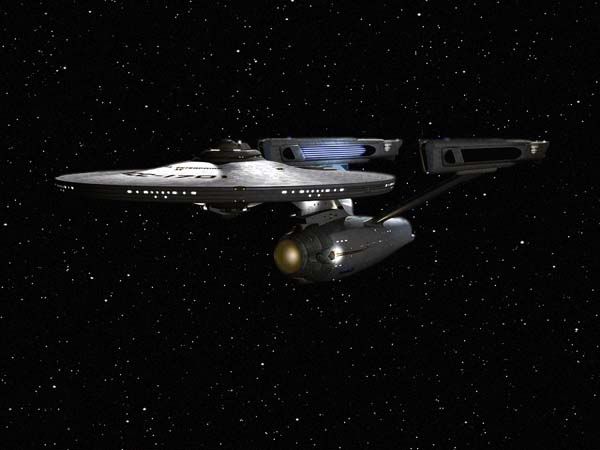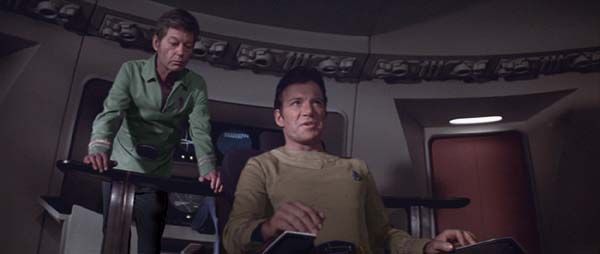Star Trek - The Motion Picture (1979) ****
The Enterprise races to intercept an immense unknown object headed for Earth and destroying everything in its path.
One thing that undeniably hurts ST-TMP is the lack of context. It's not 1979 anymore. Viewers are no longer seeing at after a drought of ten years without any new
Star Trek (setting aside TAS and a handful of books). There are things in this film you likely wouldn't think of doing today simply because we've been inundated with Trek since the 1980s.
Certain expectations also work against the film.
Star Trek has been best on television where it was offered up in one hour segments. Television is a medium of brevity and it can rarely afford to take the time to really explore ideas. It usually has to be snappy and tightly paced. The constraints of television production also mean you have to be really creative to be effective in your storytelling. Yet it also means that you're rarely compelled to be epic and you can focus on smaller scale stories.
A feature film almost demands that your story be epic. In extent it also allows you the luxury of time to dwell on certain things whether they be visual or expository. Sometimes that works...and sometimes it doesn't.
Today the beginning of ST-TMP can feel like it drags. Thats partly because contemporary films are often paced more quickly than those of thirty years ago. Audiences often aren't as patient today. The other reason is one of context. In '79 we didn't mind seeing how all our favourite characters were brought back together. Roddenberry and Wise chose to show the idea that time had passed since the end of the
Enterprise's five-year mission and that our heroes had drifted apart and were no longer in sync with each other. Hence we had to see them reunited and rediscovering their place with one another. This was also acknowledgement of the very real fact the original cast was visually older than what they had been in TOS. I think it works in the film and it reflects a sense of credibility after a group of people have been apart for an extended time. Indeed it would have seemed unbelievable if everyone had just fallen into place as if nothing had happened.
Unfortunately just as everyone is beginning to gel again there's nothing of character substance to replace it. Sadly they had an inkling of an idea, but they chose not to explore it: Decker's friction with Kirk. It really comes down to Decker acquiescing to Kirk too easily. The best example I can give of how this could have played out is a 1950's war film called
Run Silent, Run Deep. In RSRD Burt Lancaster is a young up-and-coming commander recently granted command of his own submarine. Everything is turned on its head when an older officer (played by Clark Gable) is given command for an important mission and displacing Lancaster. The tangible tension amongst the crew as well as friction and resentment between Lancaster and Gable is exactly the sort of thing that could have worked for ST-TMP. And this character drama was played out during a mission where no one knew if they would survive or not, effectively paralleling whether the
Enterprise will survive its encounter with Vger. But because we get little to nothing of that added character drama the story has to rely solely on discovering what Vger is and what it wants. In RSRD the threat to the mission is as much inside the sub as without. In ST-TMP the threat is only from the outside. That can work in a television episode where you've got only 42-50 minutes to tell your story. It gets more problematical in a two hour feature film.
The DE solves some of that problem (over the theatrical and television versions) by being deftly edited and quickening the pace of unfolding events to some extent. It helps a lot, but I could argue they could have gone a bit further in this regard, but it still wouldn't make up for the sense of something missing. I have my opinion of what's missing and someone else might have another idea.
There's another character element here that could have used a bit more screen time: Spock's dilemma. In this film Spock is finally at the crossroad where he has to decide which direction his life will take and what kind of person he's going to be. At first he thinks (as perhaps he has long thought) that he needs to purge himself of his human half to feel complete. But the film illustrates that Spock will never feel complete until he fully acknowledges and accepts his human half. More specifically he has to accept his unique nature. Spock's dilemma isn't much different from the personal crises many of us can face at one time or another.
Many have jokingly called ST-TMP the protracted episode "Where Nomad Has Gone Before." That isn't a wholly inaccurate charge, but it's not necessarily a crime to revisit a story idea. It matters more how you deliver it. Roddenberry and Wise would have done well to inject a little more of another TOS episode, "Obsession." This is similar to what I was describing from RDRD.
ST-TMP struggles with another issue of context. In the '70s and '80s we were getting a variety of SF films. Today there is an expectancy to be something of a roller coaster adventure that overloads the senses and not much time spent on any exposition or introspection. ST-TMP chose not to emulate
Star Wars released two years earlier. Whereas SW was a rollicking adventure TMP aimed for something different. I don't think it's too cerebral, but it certainly seems so compared to something like SW. Roddenberry and Wise appear intent to aim for something other than another a shoot-em-up adventure and I don't think they were consciously trying to emulate
2001: A Space Odyssey.
This is a gorgeous film to look at and restored it lays false the charge that it's monochromatic and sterile looking. It's actually quite colourful even if it isn't vivid. In TOS they were trying to depict a credible future within the constrains of television production and budget constraints. ST-TMP was able to give
Star Trek's depiction of a future a distinctly more polished look. This is evident in the elaborate sets and ship miniatures and, yes, costumes. I think this is where we see Robert Wise's imprint. He didn't just want to polish off the look of TOS, he wanted a credible look to their future vision and one that wouldn't necessarily gel with contemporary sensibilities. And thats a reflection of how much real thought went into this film. They were convinced the setting had to look convincing to help audiences buy into the story. It worked...mostly.
The opening sequence of ST-TMP could well be one of the best for Trek features. It was certainly very effective in 1979. Three highly detailed Klingon Battle Cruisers take on an immense alien object. The Klingons are now much more alien looking and with their own language (with English subtitles). They're still belligerent and shortly have their warrior asses handed to them. we next get to see Vulcan as we've never seen it before as well as a long-haired Spock amongst of group of Vulcans speaking their own language (with English subtitles). Televisied
Star Trek was never like this because they couldn't afford to do it. Here a feature film allows you to do something rarely seen in television.
The resolution of TMP feels a bit anticlimactic and mostly because it works well enough for a science fiction film, but might leave something to be desired for viewers weaned on explosive action for an ending. And I think this is where TMP runs into some trouble: it's trying to be two kinds of films, a
Star Trek adventure and a thought provoking science fiction film. It works as a SF film, but it suffers a bit as a
Star Trek film. Note I say it suffers and not that it fails---two different things.
Overall I quite like ST-TMP. I think it's quite good. I like it better now than one I was younger. It has a lot of excellent things in it even if there's a little something missing to make it excellent.
It feels like Gene Roddenberry's series idea writ large, but it could use an extra measure of passion.




